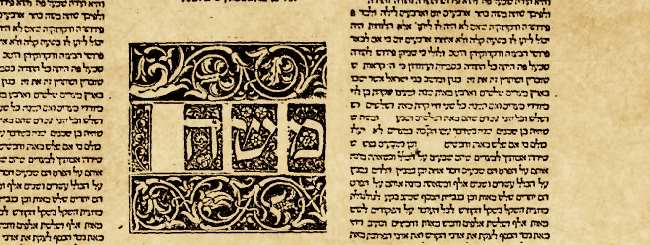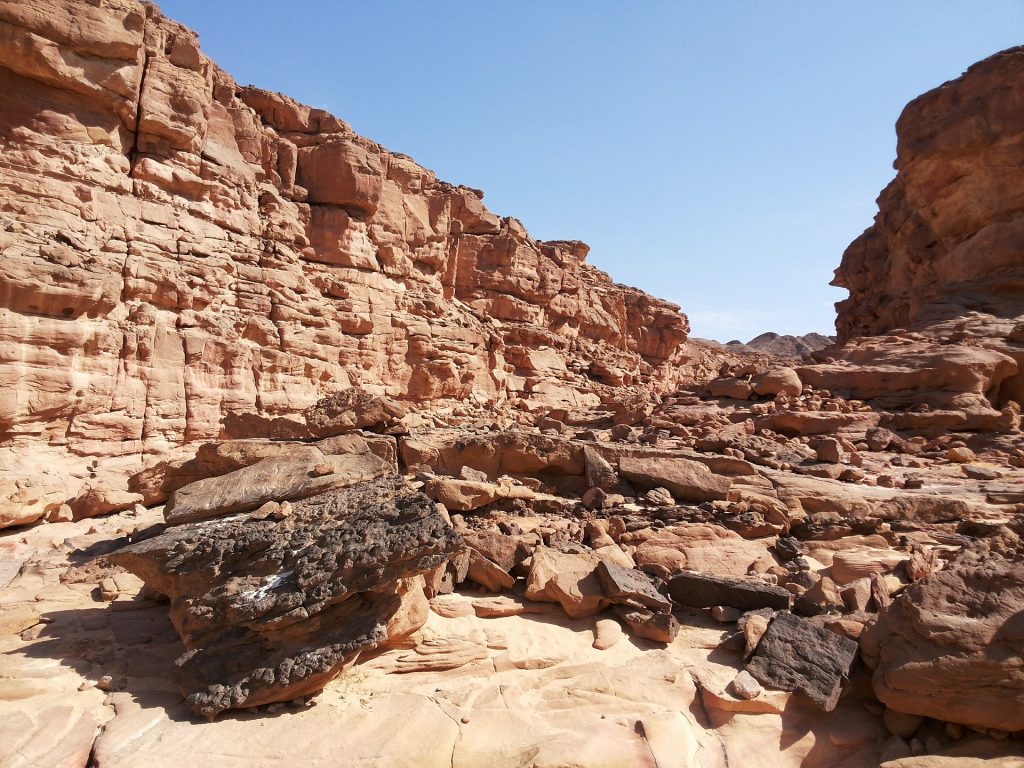
(3-4 Minute Read)
Exodus 18:1 – 20:23
Yitro was the priest of Midian and the father-in-law of Moses who lent his name to this Torah parasha, or portion. Yitro heard of all that the Almighty had done for Moses and the Israelites. He brought Zipporah, Moses’ wife, along with their two sons, Gershom and Eliezer, to Moses in the wilderness. Moses went out to meet Yitro, and recounted all that the Most High had done to the Egyptians. Yitro praised the Eternal One, and declared that he was now convinced that the Most High was greater than any other so-called “gods.” Yitro brought a burnt offering, and Aaron and all the elders of Israel joined the meal.
The next day Moses served as magistrate among the people from morning to evening. Upon Yitro’s inquiry, Moses explained that the people came before him with their disputes, and he decided between them and made known the teachings of the Almighty. Yitro countered that Moses would wear himself and the people out through such a method. Yitro instead suggested that Moses teach the people the laws of the Most High and the way they were to go. He further advised that Moses should find capable, trustworthy men who feared the Most High and spurned bribery, and set them as chiefs of thousands, hundreds, fifties, and tens. These chiefs would judge the minor disputes themselves, and bring the major disputes to Moses. Yitro noted that if this suggestion was in accordance with the Almighty’s commands, the results would be better for everyone.
Moses heeded his father-in-law and did exactly as he suggested. Moses bade farewell to Yitro, and he returned to his own land.
On the third new moon (i.e. beginning of the month) after the Israelites had departed from Egypt, the Israelites entered the wilderness of Sinai and encamped in front of the mountain. The Almighty called to Moses from the mountain, telling him to declare to the Israelites that they had seen what He did to the Egyptians, and brought them out “on eagles’ wings.” If they obeyed the Most High and observed His covenant, they would be a treasured possession — a kingdom of priests and a holy nation.
Moses summoned the elders of Israel and relayed the communication. All the people answered in unison, saying, “All that the Almighty has spoken we will do!”
Moses relayed the answer of the people to the Eternal One, Who indicated that He would come to Moses in a thick cloud, so that the people would hear Him speak to Moses and so trust Moses ever after. The Holy One, Blessed be He, further instructed Moses to command the people to stay pure and wash their clothes. On the third day the Almighty would come down, in the view of all the people, on Mount Sinai. Boundaries were to be placed around the mountain, that neither human nor animal would approach it; any who did would be executed. Moses instructed the people accordingly.
On the third day at dawn, there was thunder, lightning, and a dense cloud upon the mountain accompanied by a long blast on the ram’s horn (Hebrew shofar). Moses led the people out of the camp to the foot of the mountain. Mount Sinai was all in smoke, and it trembled violently. As Moses spoke, the Almighty answered him in the thunder. The Most High called Moses to the top of the mountain, and told him to warn the people not to break through to gaze at the Almighty, lest they perish. Moses affirmed that they had placed boundaries around the mountain. The Almighty instructed him to return with Aaron, but none of the other priests or people. Moses went down and spoke to the people.

The Most High said:
“I am the L-RD your G-d Who brought you out of Egypt.
You shall have no other gods besides me. You shall not make a sculptured image of anything, nor bow down to them or serve them. For I am an impassioned G-d, visiting guilt upon the third and fourth generation of them who reject Me, but being merciful to the thousandth generation of them who love Me and keep My commandments.
You shall not swear falsely (or take in vain) the name of the L-RD your G-d.
Remember the sabbath day and keep it holy. You shall not work on the seventh day, for the L-RD created the universe in six days and rested on the seventh. Therefore he blessed and sanctified the sabbath (seventh day).
Honor your father and mother.
You shall not murder.
You shall not commit adultery.
You shall not steal.
You shall not bear false witness against your neighbor.
You shall not covet your neighbor’s house, wife, servant, livestock, or anything else that is your neighbors.”
All the people witnessed the thunder, lightning, blare of the ram’s horn, they fell back and stood at a distance. They requested that Moses speak to the Almighty on their behalf, lest they die. Moses told not to be afraid, explaining that the Most High only sought to instill in them a reverence of Him for perpetuity so they would not go astray.
Moses approached the thick cloud where the Eternal One was. The Almighty instructed Moses to tell the Israelites that they themselves saw that He spoke to them from the heavens. Therefore, they were never to make any “gods” of silver or gold (i.e. idols). They were only to make altars of earth or unhewn stones without tools for their offerings. They were also not to ascend His altar by steps, lest they expose themselves.
The Torah parasha of Yitro is most famous for the issuing of the Aseret HaDibrot, or Ten Commandments, at Mount Sinai. While obviously the Mount Sinai encounter is paramount, the events and instructions leading up to this experience are also essential for the establishment of the Jewish religious system.
After Moses was reunited with his father-in-law, Yitro observed an inefficient methodology of answering the questions and judging the disputes of the early Jewish people. Moses originally had attempted to tackle every single issue himself, to the weariment of both himself and the people of Israel. Yitro insisted that such an approach was not sustainable. Instead, Moses was advised to establish a hierarchy of religious infrastructure in which delegated leaders would function more directly with the people under his supervision and bring more complicated matters to Moses. Yitro emphasized that his advice should only be adopted upon approval by the Most High.
In reality, Yitro essentially initiated the precursor to the rabbinical and Halachic system, as it would evolve throughout Jewish history. The premise of the rabbinic system is that a structure of rabbis guide the Jewish community at the various levels. At the higher levels, great rabbinical “giants” have established guidelines, often preserving their rulings in writing for future generations. All of these rabbis, especially at the higher levels, are careful to ensure that their rulings and guidelines are derived from and completely compliant with the instructions of the Almighty and Moses as recorded in the Torah. In other words, even in the twenty-first century the same model applies. The Most High first issued commandments through Moses, which were documented in the Torah. Various great rabbinical masters, ranging from Rabbi Hillel to Rashi to the Rambam to Maran Yosef Caro, et al, have served as “elders” and “chiefs of thousands” to further explain and enforce the laws and commandments of the Almighty as recorded in the Torah. Under their direct or indirect guidance, local rabbis and Jewish leadership function further, just like the “chiefs of hundreds, fifties, and tens.” While the titles and other nuances might have evolved, the principles and dynamics of our rabbinical and Halachic systems are the same, even now. Interestingly enough, Yitro even uses a term similar to “Halacha,” saying that Moses should be the teacher and authority instructing all, especially the chiefs and elders, as to “the way they are to go.” The word used here is y’lechu, which is a verb variant of the Hebrew noun, halacha.
Another principle of Halacha is the idea of chumra, or “making a fence around the Torah.” In the very first passage of Pirkei Avot, “The Ethics of the Fathers,” this same principle is cited:
Moses received the Torah from Sinai and passed it on to Joshua; Joshua to the Elders; the Elders to the Prophets; and the Prophets passed it on to the Men of the Great Assembly. The Men of the Great Assembly said three things: Be deliberate in judgment; raise up many disciples; and make a fence around the Torah.

The idea of chumra also is derived from Deuteronomy / Devarim 22:8, which states that a balcony or terrace-style roof should have a fence around it.
Some have suggested that the instructions of the Most High to place boundaries and fences around Mount Sinai in preparation for the intense encounter with the Holy One, Blessed be He, could be used as another metaphor for this “fence around the Torah.” The Almighty gave the command that no one, human or animal, should trespass and touch the mountain. Accordingly, a fence was built around the prohibited mountain in order to ensure that no one came too close. The fence prevented any confusion or ambiguity; everyone knew where the boundary was. Thus, a fence was (quite literally) created around the prohibition to guarantee compliance.
These concepts are the basis of Halacha. We have a system of rabbinical elders, both past and present, who continue in many ways the functions of the “chiefs of tens, fifties, hundreds, and thousands” as implemented by Moses with the implied approval of the Most High (e.g. Exodus / Shemot 18:19, 23). Additionally, a principle of “setting fences” around prohibited acts or items was instituted immediately prior to and during the Mount Sinai experience, with similar themes being reiterated later both in the Torah and works of rabbinical wisdom. In these cases, the Almighty Himself commanded the establishment of these “fences.” Thus, we see that the origin of rabbinical Halacha was established by the Holy One, Blessed be He, BEFORE He gave us the Torah commandments at Mount Sinai. In other words, the implication could be that the Most High operated in the capacity that the Torah simply cannot be kept properly without rabbinical Halacha. Therefore, the Holy One, Blessed be He, guided Moses both through the advice of Yitro as well as direct commandments regarding the fences and boundaries around Mount Sinai to establish the religious infrastructure and systematic dynamics required to successfully observe the Torah. Only after the concept of Halacha and rabbinical authority was established did the Most High commence the giving of the Torah commandments. Perhaps the Almighty knew that efforts to keep the Torah without Halacha and rabbinical guidelines inevitably flounder, or even fail completely. Thus, the Most High established those principles and institutions even before the giving the Aseret HaDibrot, or Ten Commandments.
May the Holy One, Blessed be He, ever assist us and our leadership to function in an effective and harmonious manner for the maintenance and betterment of our families and communities. And may the Holy One, Blessed be He, enable us to also put healthy boundaries and “fences” around prohibitions in order to keep the Torah to the best of our ability, and thereby achieve the highest level of connection with Him possible, and enjoy the ensuing blessings thereof.


